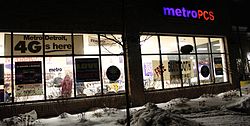- MetroPCS
-
MetroPCS Communications, Inc. 
Type Public Traded as NYSE: PCS Industry Telecommunications Founded 1994 Headquarters Richardson, Texas, U.S. Key people Roger D. Linquist
(Chairman, President & CEO)Products Wireless Revenue  US$ 4.069 billion (2010)[1]
US$ 4.069 billion (2010)[1]Operating income  US$ 718.9 million (2010)[1]
US$ 718.9 million (2010)[1]Net income  US$ 193.4 million (2010)[1]
US$ 193.4 million (2010)[1]Total assets  US$ 7.919 billion (2010)[1]
US$ 7.919 billion (2010)[1]Total equity  US$ 2.542 billion (2010)[1]
US$ 2.542 billion (2010)[1]Employees 3,600 (December 2010)[1] Website MetroPCS.com metroPCS store, Ypsilanti Township, Michigan
MetroPCS Communications, Inc. (NYSE: PCS), formerly known as General Wireless, Inc., is an American mobile phone service provider. It operates the fifth largest mobile telecommunications network in the US, with 8.9 million subscribers as of May 2011. The company, a Delaware corporation, is headquartered in Richardson, Texas.
MetroPCS uses CDMA technology to offer service in addition to its 4G network using LTE technology.
Contents
History
MetroPCS was established in 1994 as General Wireless, Inc., by Roger D. Linquist[2] and Malcolm Lorang,[3] both of whom were previously executives with wireless provider PageMart Wireless. The company changed its name to MetroPCS Communications, Inc. in 1998 to reflect the company’s goal of providing affordable, unlimited wireless services in major metropolitan areas across the country for consumers traditionally underserved by existing wireless carriers.
Rate Plans
MetroPCS offers unlimited talk, text, and Web service and 411 directory assistance services on four flat-rate plans priced at $40, $45, $50, and $60 - additional options and features vary depending on the rate plan.[citation needed]
MetroPCS covers approximately 90 percent of the U.S. population (in excess of 280 million people) through Metro USA nationwide service, launched in 2010 and free to subscribers. Unlimited talk, text and Web service with Metro USA coverage is available for all existing and new subscribers on the Wireless for All and 4G service plans.[citation needed]
MetroPCS has stores in 19 metropolitan markets and surrounding areas including New York City/Northern New Jersey, Atlanta, Bakersfield, Boston, Dallas, Detroit, Jacksonville, Las Vegas, Los Angeles, Miami, Orlando, Philadelphia, Riverside, Sacramento, San Francisco, San Bernardino, San Jose, Shreveport, and Tampa.[citation needed]
Reception and criticism
GigaOM's Kevin Tofel noted that although the LTE network is based on 4G technology, "the infrastructure MetroPCS is using keeps speeds in the range of older 3G networks". Tofel measured data speeds "far slower than T-Mobile’s HSPA+ network" but considered that users with only basic data requirements would find the no-contract deal "refreshing".[4] Referencing Tofel's review, Laptop Magazine's Corvida Raven concluded that MetroPCS "probably isn’t using the best LTE technology."[5]
CNET reviewed the Samsung Craft in October 2010 and said : "The Samsung Craft is one of MetroPCS' most advanced feature phones, and its 4G capabilities are an added draw for those in the carrier's LTE markets. The Samsung Craft is the first 4G-enabled phone for MetroPCS...It has a bright, crisp AMOLED display and it supports 32GB expandable memory and HD video playback". Its overall rating was 3 1/2 stars (Very Good) out of 5 stars. [6]. While on the other hand a February 2011 article on Slate.com suggested that MetroPCS was able to roll out 4G coverage sooner and cheaper than its competitors because only one handset (as of the time of the article) was able to access its 4G network, and that the device's Internet capabilities were substandard.[7] The article described the Samsung Craft as "The worst cell phone on Earth". The review also noted that MetroPCS's "unlimited web" data plan does not include most web video.
MetroPCS's TV commercial series features two Indians "Ranjit" and "Chad" who make fun of American popular culture, which received mixed reviews. Many Indians and Americans found it to be in bad taste and offensive, or even racist.[8]
See also
References
- ^ a b c d e f "2010 Form 10-K, MetroPCS Communications, Inc.". United States Securities and Exchange Commission. http://www.sec.gov/Archives/edgar/data/1283699/000119312511051403/d10k.htm.
- ^ http://www.metropcs.com/about/managementdetails.aspx?Bio=1
- ^ http://www.metropcs.com/about/managementdetails.aspx?Bio=2
- ^ Tofel, Kevin C. (Nov 26 2010). "For $55, What Kind of LTE Experience Does MetroPCS Deliver?". GigaOM. http://gigaom.com/2010/11/26/metropcs-4g-review-lte/. Retrieved 5 December 2010.
- ^ Raven, Corvida (Nov 26, 2010). "MetroPCS’s LTE Service Tested, Found Wanting". Laptop Magazine (Bedford Communications Inc). http://blog.laptopmag.com/metropcss-lte-tested-found-wanting#axzz16V61CLC5. Retrieved 5 December 2010.
- ^ Dolcourt, Jessica. "Samsung Craft SCH-r900 - black (MetroPCS).". CNET. http://reviews.cnet.com/cell-phones/samsung-craft-sch-r900/4505-6454_7-34182454.html#reviewPage1. Retrieved 29 April 2011.
- ^ Manjoo, Farhad. "4G, Samsung Craft, MetroPCS: The worst cell phone on earth.". Slate. http://www.slate.com/id/2283747/pagenum/all/. Retrieved 10 March 2011.
- ^ Edwards, Jim. "It’s Racist But It Works: MetroPCS’s “Ranjit and Chad” Commercials Boost Sales". BNET. http://www.bnet.com/blog/advertising-business/its-racist-but-it-works-metropcss-8220ranjit-and-chad-8221-commercials-boost-sales/4943. Retrieved 25 July 2011.
External links
US mobile network operators National Super-regional Minor-regional Alaska Wireless · Cellcom Wireless · Cellular One · Cincinnati Bell · i wireless · Immix · nTelos · Pocket Wireless · Revol Wireless · SouthernLINC Wireless · West Central WirelessVirtual 7-Eleven · Assurance Wireless · Boost · Consumer · Hawaiian · I-wireless · Jitterbug · Kajeet · KDDI · Liberty · Lucky · MOSH · Movida · Page Plus · Net10 · Simple Mobile · TracFone Wireless · Tru · Straight Talk · Trumpet · Virgin Mobile · NTT DOCOMO USADefunct AirTouch · Amp'd Mobile · AT&T Wireless Services · Common Cents Mobile · Disney Mobile · Dobson Cellular · Edge Wireless · Helio · Jump Mobile · Midwest Wireless · Nextel Communications · Northcoast PCS · Powertel · PrimeCo · Rural Cellular · SunCom · Unicel · Upoc Networks · Voce · Western Wireless CorporationCategories:- Companies listed on the New York Stock Exchange
- Companies established in 1994
- Mobile phone companies of the United States
- Companies based in Dallas, Texas
- Madison Dearborn Partners companies
Wikimedia Foundation. 2010.

